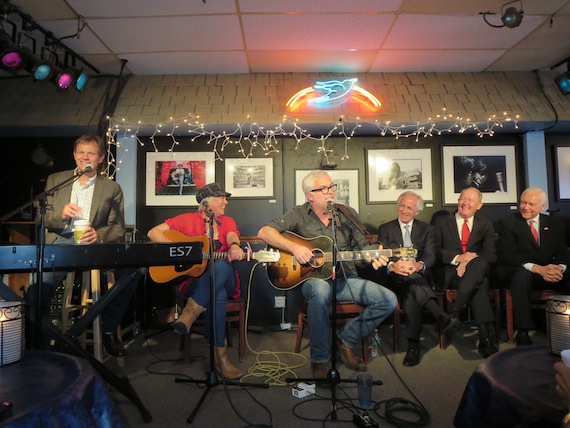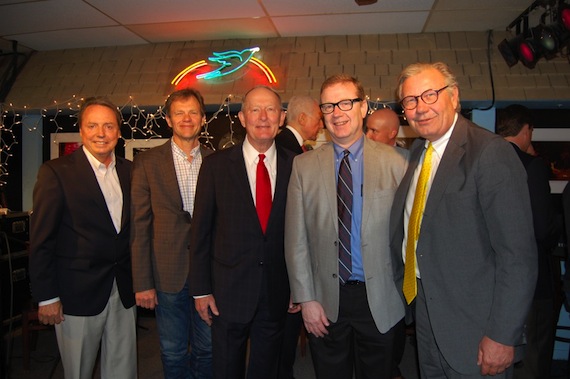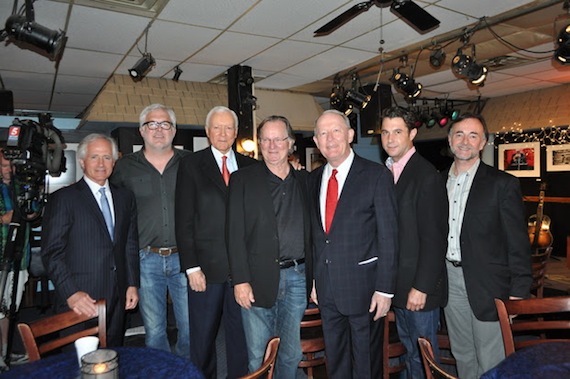

(L-R): Songwriters Tom Douglas, Roxie Dean and Rivers Rutherford perform as Senators Bob Corker, Lamar Alexander and Orrin Hatch look on.
The Songwriter Equity Act is being introduced in the U.S. Senate, following a previous introduction in the House of Representatives.
Senators Lamar Alexander (R-Tenn.), Bob Corker (R-Tenn.) and Orrin Hatch (R-Utah) gathered at the Bluebird Cafe in Nashville today (May 12) to announce the legislation to amend federal law to allow songwriters to be compensated for the fair market value of their work.
NSAI’s Bart Herbison explained that following introduction of the bill, the Senators will gather sponsors for it, adding that all three Senators have a proven track record of bi-partisan support. Herbison noted that the Tennessee Senators understand the dilemma of the songwriters and the artistic community, and that Hatch’s involvement is important because he is a songwriter himself and a senior member of the Judiciary Committee that would consider the legislation. The announcement took place in Nashville because Music City has played a crucial role in the legislation and has such a strong creative community. Herbison said several organizations have been instrumental in the legislation, including the performing rights organizations ASCAP, BMI and SESAC, as well as the NMPA, NSAI, The Recording Academy and the Church Music Publishers Association.

Pictured (L-R): BMI’s Jody Williams, BMI songwriter Tom Douglas, U.S. Senator Lamar Alexander, BMI’s Stuart Rosen and Smith-Free Group’s Tim Locke.
Songwriters Roxie Dean, Lee Thomas Miller, Tom Douglas and Rivers Rutherford performed and discussed the importance of removing government restrictions.
The legislation would allow songwriters to receive market-based compensation and remove government price controls in two ways:
• It would direct the Copyright Royalty Board to set compensation according to the fair market value when songs are sold, such as through music downloads and CD purchases.
• It would remove a provision of law that narrows the scope of evidence the federal rate court may examine when asked to set songwriter compensation for when their song is played, such as in a restaurant or at a concert.
Songwriter compensation is dictated by the federal government. The rate of compensation that is set by the Copyright Royalty Board has increased only 7 cents over 100 years, and is currently 9.1 cents per song. The so-called “federal rate court” determines compensation rates for public performances, occasionally requiring songwriters to engage in complex litigation to be paid reasonable fees for their work.
NMPA leader David Israelite said, “The SEA takes an important step directing the CRB to use a ‘willing-buyer/willing-seller’ rate standard to more fairly approximate what a song is worth in the free market. We must inject fairness into an outdated process that is undeniably stacked against songwriters and publishers, ensuring they are rightly compensated for their work.”
The legislation the senators introduced is the Senate companion to H.R. 4079, legislation introduced on Feb. 25 by U.S. Rep. Doug Collins (R-Ga.) with 14 cosponsors, including U.S. Reps. Marsha Blackburn (R-Tenn.), Phil Roe (R-Tenn.), Steve Cohen (D-Tenn.) and Jim Cooper (D-Tenn.).

Senator Bob Corker, ASCAP Songwriter Rivers Rutherford, Senator Orrin Hatch, ASCAP Board member Wayland Holyfield, Senator Lamar Alexander, ASCAP’s Michael Martin and ASCAP Board Member Barry Coburn. Photo: ASCAP’s Alison Toczylowski.

Category: Featured, Financial/Legal, Organizations, Publishing
About the Author
Sarah Skates has worked in the music business for more than a decade and is a longtime contributor to MusicRow.View Author Profile


